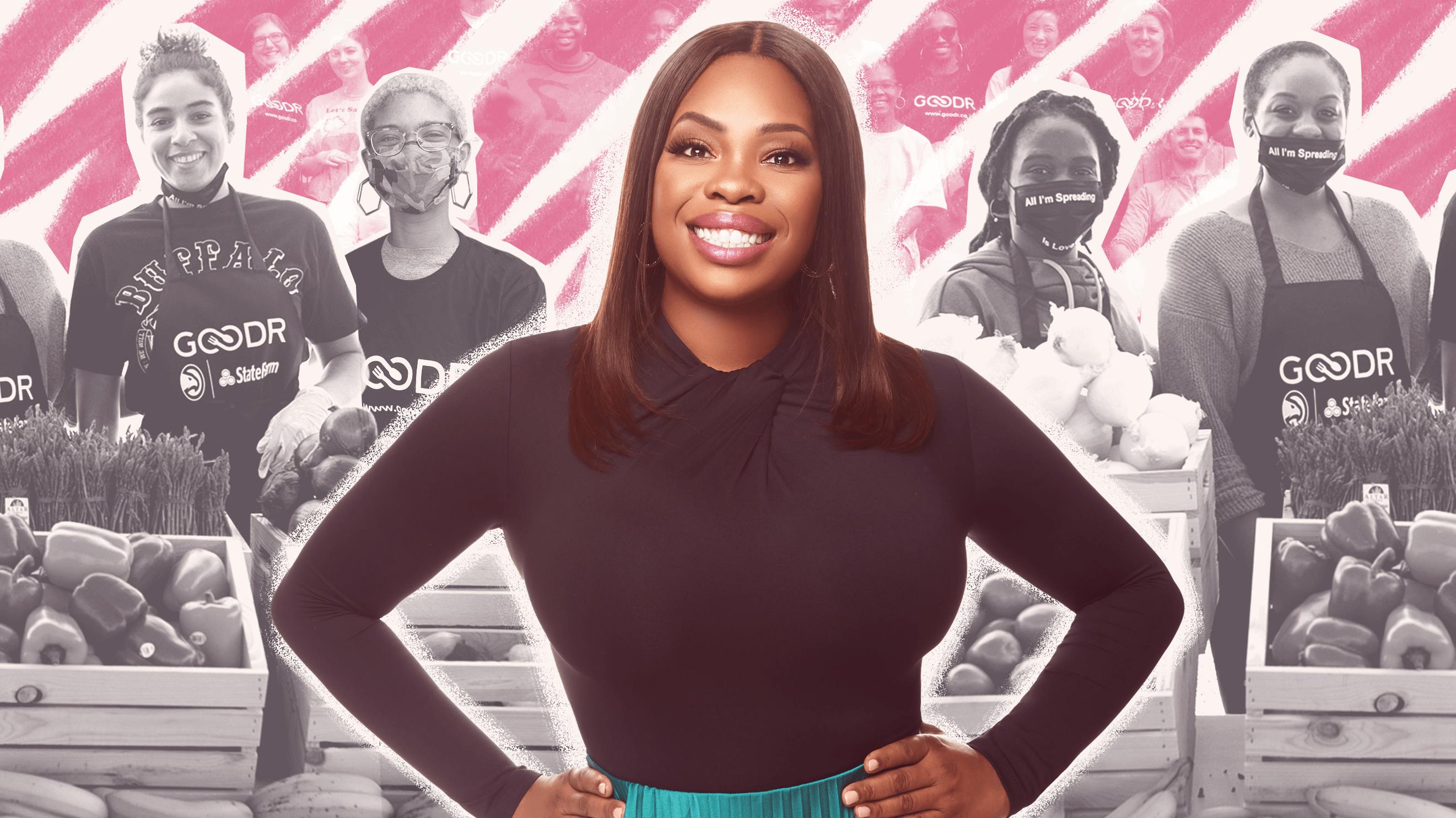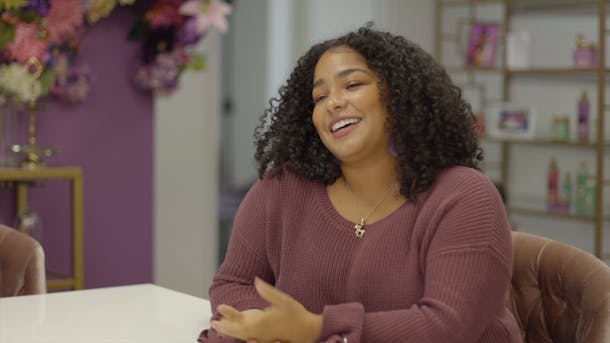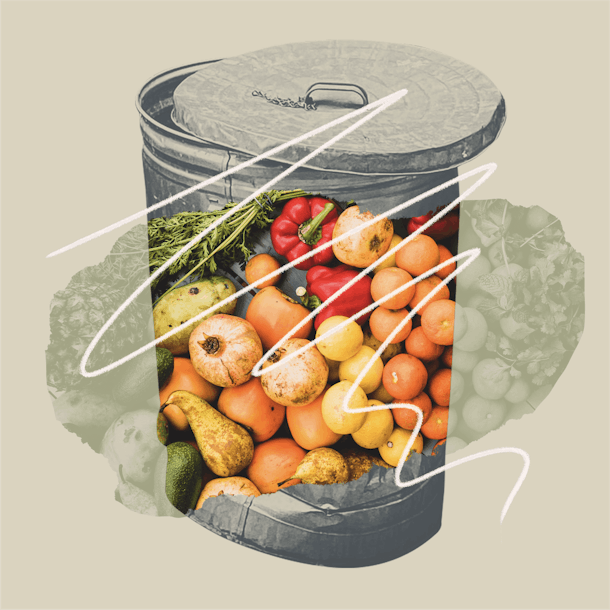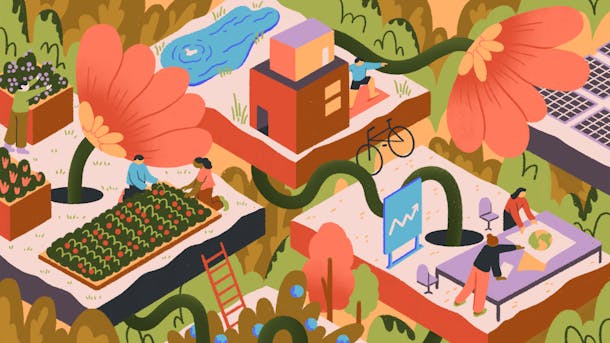
Feature Story
Impact means everything for Goodr’s Jasmine Crowe
Pairing passion with pragmatism, this founder is reimagining waste management to benefit the environment, the food service industry, and food-insecure communities.
It’s hard not to be a little bit in awe of the calm, confident way that founder and CEO Jasmine Crowe presents the problem she aims to solve through her social impact startup, Goodr.
“Over 72 billion pounds of perfectly good, edible food is taken to landfills in the U.S. every year, where it ultimately produces methane gas, a leading contributor to global warming. At the same time, 42 million people are suffering from food insecurity in this country,” she said. “That’s the problem we’re going after.”
It’s a big problem. It’s easy to imagine most entrepreneurs running fast in the other direction, but Jasmine ran toward the problem instead. Why? She saw an opportunity to frame the issue and the solution in a different way.
“We don’t think hunger is a scarcity issue. It’s a logistics problem,” she said of the company’s approach. The solution lies in connecting food with the people who need it.
To work toward that solution, Goodr developed a platform that tracks the supply chain in order to serve both food service customers who are managing food waste — and already paying to have that waste disposed of — and nonprofits looking to feed people.
But while the problem is irrefutable and the solution makes so much sense for food service companies’ bottom lines and sustainability efforts, funding and growing Goodr has not been an easy road. Jasmine’s entrepreneurial journey is ambitious and scrappy and inspiring — a testament of the power of business to make an impact and a reminder of the grit it takes to fund and grow a big idea from the ground up.
From “Sunday Soul” to startup
In 2013, Jasmine was living in Atlanta and working as a consultant to high-profile clients launching nonprofit organizations. As she drove through downtown one day, she was especially struck by the number of people experiencing homelessness and in need of food.
It certainly wasn’t her first time noticing the state of homelessness and food insecurity in her city, but on this day it hit home in a new way. “I just saw the issue really clearly in that particular moment — people were hungry and I wanted to help,” she said.
While Jasmine didn’t have any background in food service or culinary training, she did have compassion, an entrepreneur’s drive to solve a problem, and a desire to make a difference.
“I knew I could cook, so that’s what I decided to do. That’s how all of this started,” she said.
For the next three years, Jasmine cooked in her apartment almost every weekend and brought meals — not just food items, but home-cooked meals — to the streets of Atlanta, creating what she called “Sunday Soul” pop-up restaurants for folks experiencing food insecurity and homelessness.
When a 15-second video of her volunteer efforts went viral in 2015, people started asking her which businesses were donating food.
“The reality was that nobody was donating,” Jasmine said. She was spending her own money to feed up to 500 people each week, clipping coupons and price-matching, catching sales as she could, and patching together deals to create the meals. When she considered the impact donations could make, she started digging into research, focused on finding out what happens to excess food from food service businesses.
“I read everything I could find to understand the issues of food producers, sustainability, and the waste management industry,” she said.
What she learned was shocking — about both the state of hunger in the U.S. and the environmental costs of food waste.
Up to 40% of the food produced in the U.S. is never eaten, while 13.8 million households in America (10.5%) are food insecure, meaning they are uncertain of where their next meal will come from or unable to access enough food to feed the members of their household.
When surplus food makes its way through a waste management process, it accounts for 27% of the waste in landfills. As it decomposes over time, the methane gas it produces contributes significantly to global warming. In the U.S., food waste generates the equivalent of 32.6 million cars’ worth of greenhouse gas emissions.
“I began to really understand more about what food waste meant for the environment,” Jasmine said, “and it began to upset me because I thought: Wow, food waste is really doing an injustice to people and the planet.”
She also learned that the impact of food waste was a blow to a company’s bottom line. Not only is the food going unpurchased, but when a food vendor throws away food, they are missing out on the opportunity to donate that food (edible and non-edible) and receive a tax benefit. Forty billion dollars in tax benefits go unclaimed each year by businesses that could have donated food waste. They’re also paying significant fees to waste management companies to take the food to a landfill.
With excess food being produced and thrown away every single day in her own city, Jasmine thought: What if she could recover and redistribute that surplus to people who were hungry?
Once she considered the problem from that angle, she dove into developing a solution. She saw the opportunity to do good, the ability to offer cost savings and sustainability wins for businesses, and the potential for significant scale — hunger exists everywhere, after all, and food waste is a global issue.
The business plan: Solve hunger with technology
Solving hunger. No biggie, right? While the scale of the problem was enormous, Jasmine had already experienced the impact of feeding people through Sunday Soul; she had seen how one meal could nourish not only a body, but a spirit. She knew what a difference this work could make.
So, rather than be intimidated by the prospect, she jumped in. As she learned more about the broader impact of food waste, she realized the opportunity for what she describes as a “triple win” for the food service industry, the environment, and those experiencing food insecurity.
“I saw that companies were already paying to throw the food away. If that food could be re-distributed to nonprofit organizations that feed people, we could reduce environmental impact and hunger — and offer a tax benefit for that donation.”
To make it all happen, she needed a logistics conduit — a pathway to recover and redirect the food. Jasmine’s answer came from a form of technology she and many others in the Atlanta area had started using regularly by that point: food delivery apps.
If food delivery apps (like GrubHub and Seamless, for example) could connect restaurants with customers around the city, couldn’t a similar concept be put to work to redistribute perfectly good excess food to people who need it?
Specifically, Jasmine began to think through how to develop a SaaS (software as a service) platform for businesses to tackle all parts of the process: from tracking the supply chain and coordinating food waste pickups and donations to logging transactions for tax filing and analyzing their sustainability efforts.
With a clear idea of what she wanted to build, Jasmine knew the next step, developing the technology itself, would be expensive. “Scaling a software company takes a lot of money,” Jasmine said. “I couldn’t build the technology without the capital.”
Persistence pays off on the tough road to launch
Fueled by her vision for all that Goodr could accomplish, Jasmine sought funding to launch the company and pay for developers to build the app.
“I knew my funding wouldn’t come from family and friends — that just wasn’t an option — so I started looking at other resources, and I discovered pitch competitions,” she said.
With no prior experience pitching to investors, Jasmine focused on developing a presentation that she felt would tell a compelling story — a story that reflected her personal drive to solve hunger and the benefit to companies served.
But early responses (or lack thereof) led her to change that approach.
“Initially, when I was pitching to potential investors and to potential clients, I wasn’t getting the positive response I expected. I didn’t understand why this wasn’t appealing, why it wasn’t an automatic win,” she said.
It turns out, many of the investors she spoke to were more interested in the bottom line than they were in social impact.
“I learned early on to talk about the business opportunity, not the social benefit,” she said. “Most investors hadn’t had any experience with food insecurity and, sadly, didn’t actually care about ending hunger or feeding people. So, instead, I focused on the cost savings available by reducing food waste — and the added benefit of serving people in need.”
With her pitch tweaked, Jasmine raised over $250K in 2017 through competitions, as well as additional funds through angel and venture capital investment. Her initial fundraising effort totaled $1.5 million, which covered the cost of developing the first version of the Goodr app.
The process was grueling.
“I took over 200 meetings to raise that first round of funding,” Jasmine said. It was a tough road to launch, but the “why” driving her effort was a pretty powerful incentive: “I want to solve hunger, and that motivated me every day.”
Launch is just the beginning — perseverance and growth come next
With enough capital to develop the first version of the app, Goodr was up and running in 2018. But Jasmine knew she couldn’t rest easy. The funds raised were only a start, and securing customers and ongoing revenue would be essential for sustainable growth.
Through the process of customer discovery, she determined that large venues, like airports and stadiums, would be the ideal users of the Goodr platform. “I had originally considered targeting restaurants, but I knew I was working to feed a large number of people who were hungry, and I needed to connect them with the most food. So it made sense to go after the businesses and the locations that had a lot of surplus food.”
With her target market in mind, winning customers also took practice. As with early investors, Jasmine learned quickly that the hook would be to focus on numbers: the cost savings and tax benefits the service would provide. Because the app facilitates delivery of surplus food to nonprofits within a three- to ten-mile radius of the customer’s location, she positioned doing good in the community as a bonus.
As she grew her customer base, she started using case studies — impact reports she created in partnership with clients — as valuable proof of concept to bolster her pitch. Among those studies, a report on Goodr’s impact at Atlanta’s Hartsfield-Jackson International Airport, one of the company’s first customers, became a significant sales tool.
The study reported that, in just six months, more than 100 food concessionaires at the airport reduced food waste by 47% and diverted more than 85,000 pounds of surplus food from landfills, redistributing over 2,000 meals to people experiencing food insecurity in the Atlanta community.
“To be able to share case studies and real-time benefits with prospective customers is so powerful,” Jasmine said.

Hunger is everywhere: Goodr’s business and impact keep growing
Since signing the airport and other early accounts, customer acquisition continues to drive the company’s growth. Today, driven by technology, the Goodr app provides businesses a secure ledger to track food waste from the time they enter the volume and dollar value of surplus food at their location to its final destination, when it’s delivered to a nonprofit organization and distributed to those in need in the community.
The app also enables a company to track and report sustainability efforts, gather info to modify food production to reduce costs, and maintain essential financial data necessary for tax filings to receive the benefit for each donation. The fee a company pays for the service is based on how much food Goodr recovers and the frequency of the service.
Goodr has grown by over 100% in the last two years, and today’s customers include the NBA, the Atlanta Hawks, Netflix, Wellstar hospital system, State Farm, and Atlanta Public Schools.
“I’ve always been proud to say that what we’ve earned in revenue far surpasses the funding we’ve raised,” Jasmine said.
Goodr, now a certified B corporation, employs 13 full-time and 26 part-time team members who have delivered over 40 million meals to date. The company’s geographic reach is also growing beyond the Atlanta market: Goodr now operates in 12 additional cities around the U.S. and regularly receives requests from potential customers in foreign countries.

Hunger is everywhere — as is the opportunity for Goodr to feed people and serve clients. We’ve built a national logistics network of partners. If a client hires us, we can start work the next day in whatever market wants and needs us.
In addition to continuing to serve customers through food recovery efforts by redistributing edible food and organic waste, Goodr now partners with customers as a distribution provider in communities where food insecurity is prevalent. Together with corporate partners, the company hosts Goodr pop-up grocery stores around the U.S., providing individuals and families the opportunity to shop for free and take home groceries otherwise unavailable or unaffordable in their neighborhoods.
“Millions of people live in food deserts in this country,” Jasmine said. “They don’t have access to food in their communities, and they have transportation barriers to reach the nearest grocery store or nonprofit. Through our pop-up grocery stores, we bring food to them.”
To further that effort, which became especially essential during the pandemic, Goodr recently partnered with the rapper Gunna, who funded the development of a fully-stocked grocery store in an Atlanta-area middle school, offering free food, clothing, and household items to students, faculty, and staff in need.
The in-school distribution offering is one Jasmine hopes to continue to grow. “By putting a grocery store in a school, a child or family can access food in their community. You can't just give kids free breakfast and lunch at school and assume you're helping to solve hunger,” Jasmine said. “Those same kids need food at night and on the weekends. Making this resource available to these students is a way to support the whole child around the clock.”
Through the struggle, Jasmine focuses on forward thinking
While the company is profitable and growing, Jasmine’s fundraising struggles continue, and she’s transparent about the uphill battle she faces in seeking additional capital to scale Goodr.
Jasmine said the publicity around her early success doesn’t reflect the real, full story — which includes limited funding to date and the constant challenge of raising more money.
“I think in the pitch competition round, I was fortunate enough to have an audience of people who cared and responded to my pitches very positively, which is how we ultimately won. But Goodr is still extremely underfunded given what we’ve built,” Jasmine said. “We have not raised nearly half of the capital that most founders do. I don't think we've figured out how to hook people just yet. We need to bring in more capital to fund expanding the team, grow more products, and launch in additional markets."
Jasmine hopes to grow the team to 20 full-time employees by the end of the year and double that by the end of 2022. “The opportunity to make an impact is massive — but to be able to attack the market, we have to be able to scale the team.”

She knows the challenges of that growth are real. The statistics that tell the story of funding for female founders are pretty dismal. Women-led startups receive only 2.3% of venture capital funding, and in 2021, only 2.6% of those women-led companies have at least one Black female founder.
“I'm a Black woman, and I'm solving a societal problem — this isn’t a get-rich-quick company. It’s about impact over the long-term, which can be a harder sell,” Jasmine said.
Given the growing interest among investors to fund women-led and minority-led companies, as well as her commitment to always be exactly who she is, Jasmine made a small but significant change in her pitching strategy — she now puts a photo of herself in her pitch deck.
In a conversation for the UBS Founders and Funders series, Jasmine noted, “I didn’t do that in earlier pitches because I was worried that someone might not want to meet with me if they saw I was a Black woman. Now, I’m more willing to share this openly. I believe that if someone doesn’t meet with me because of who I am, I will find another investor aligned with me.”
When asked what advice she would share with other women founders, she didn't hesitate: “Prepare. Do the work.” Despite the stories of “overnight” success that make the news, funding and growing a company is a long, tough journey. “I’ve been at this for over a decade, and I’m still not where I want to be,” she said. “But it’s worth every step.”
“Having the opportunity to make an impact like we have means everything,” Jasmine said. “We're trying to solve hunger. That’s a big problem, but we’re committed. I know that if we grow, it means that we're feeding a lot more people and a lot more families, which inspires me every day. There's still so much more we have to do.”



